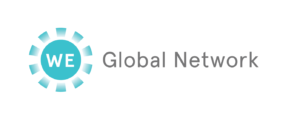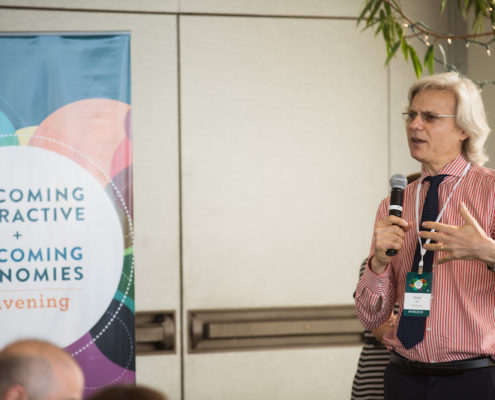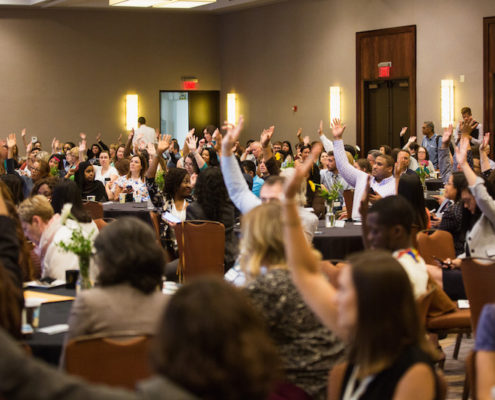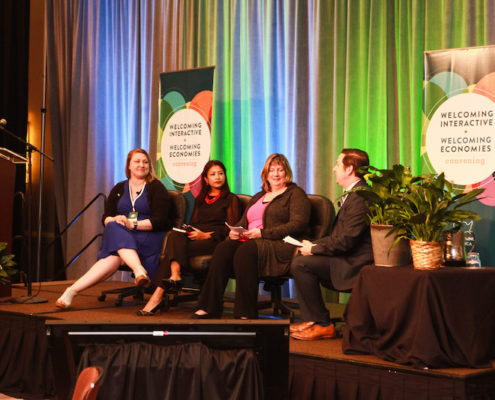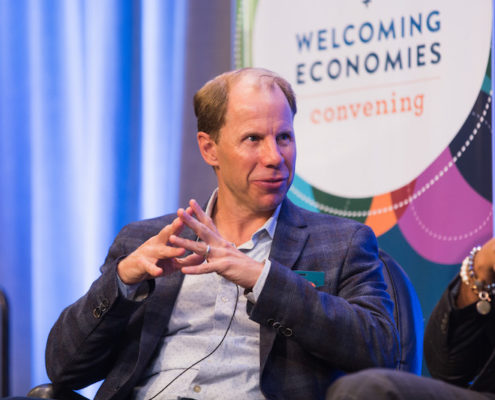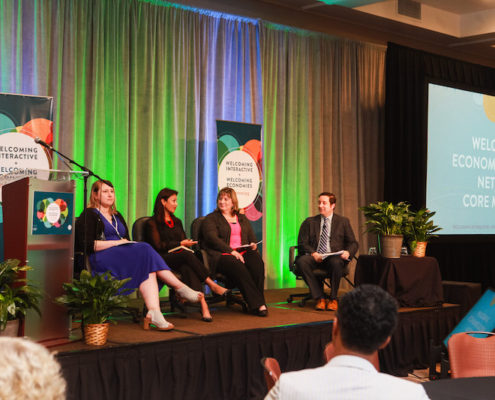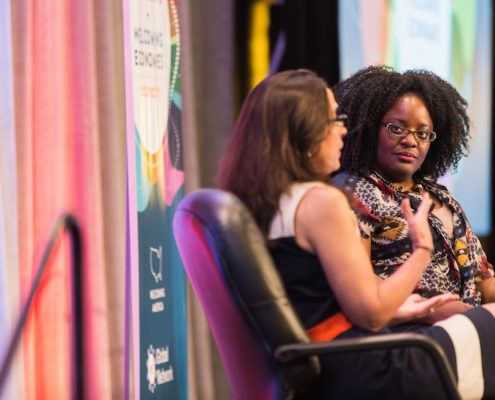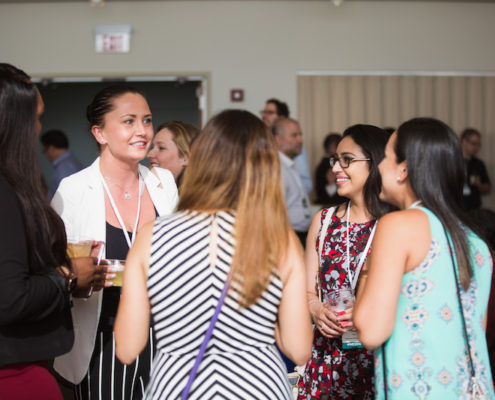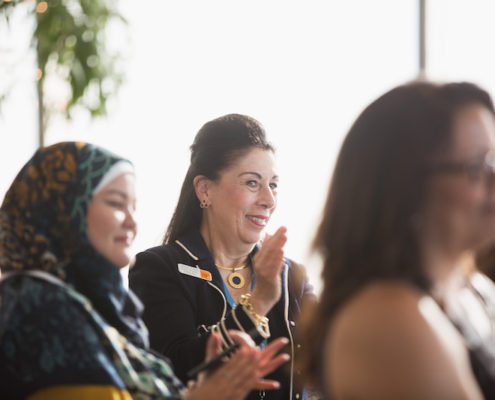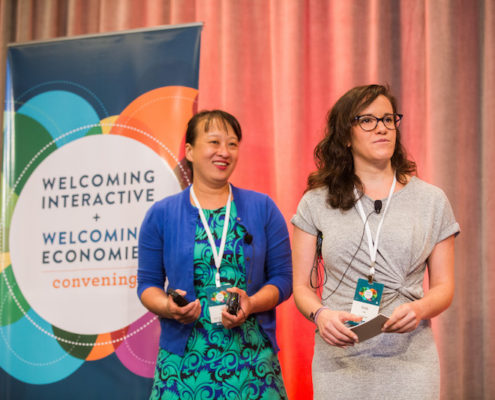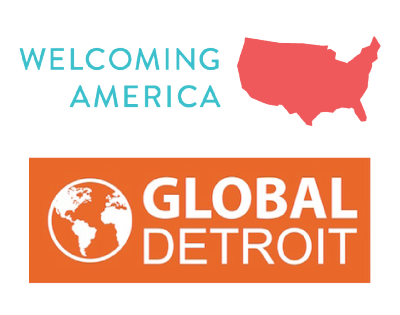Welcoming Interactive + Welcoming Economies Convening
This June, we brought together leaders across the country who are building regions that embrace immigrants as valuable contributors and foster opportunity for all.
The Welcoming Economies Convening and Welcoming Interactive joined forces as the Welcoming Interactive + Convening to merge cutting edge policies and innovative ideas from the field of immigrant economic development with successful practices and inspiring stories of welcoming communities.
Program
The 2018 agenda featured more than 20 sessions to help attendees expand their impact. In addition to sessions focused on immigrant economic development, we explored innovations in equitable access, government leadership, civic engagement, and education.
Speakers
Keynote speaker: Jennifer Mendelsohn
Mendelsohn is a seasoned journalist who’s work has appeared in numerous local and national publications including The New York Times, The Washington Post, Politico and USA Today. A native Long Islander now based in Baltimore, Mendelsohn is passionately engaged in the world of genealogy. She is the creator of Resistance Genealogy, a project that uses genealogical and historical records to fight disinformation in media discourse and highlight the unifying nature of our immigrant past.
Economic Development at WIE2018
Take a look at the 10 sessions that dove deep into immigrant economic development best practices from across the Rust Belt and beyond.
The Latest in International Student Attraction and Retention Programs
Recent rhetoric and policies, such as the travel ban, have led to decreased enrollment of international university students for the first time in over a decade. Learn about these trends, as well as how local governments and economic development programs are partnering with the private sector to connect international student graduates with unmet talent needs.
Building Wealth Strategies for Immigrant Families
While immigrant economic development programs often incorporate wealth building strategies for immigrants, few have applied the learnings from the asset building field. This session will showcase innovative approaches to creating financial security for immigrant families.
Immigrant Women: The Key to Economic Prosperity
Traditional immigrant economic development initiatives have begun incorporating gender specific considerations to support women in achieving their goals. This session will highlight leading programs that have successfully created new pathways for immigrant women. Together, we will explore how these programs reach women, the adaptations they have used to back them, and the outcomes that they have achieved.
From Launch to Growth – Building Neighborhoods through Inclusive Microenterprise
Despite the entrepreneurial experience of many immigrants and refugees within our communities, there are countless barriers that stymie their business success. Starting a microenterprise program that mitigates these barriers and creates opportunities can take various forms. In this panel we will hear from organizations that are at different stages of implementing microenterprise programs, and the role that your organization can play in sparking an effort in your community.
The Rise of Equity in the Economic Mainstream
Equity has worked its way into the lexicon and culture of mainstream economic development actors. In fact, several regional economic development agencies, as well as national trade associations, have elevated equity as a core focus. This session will discuss and define equity initiatives and how to connect immigrant economic development efforts and immigrant communities into larger mainstream equity initiatives.
Cracking the Code: Connecting Your Program to Local Workforce Development
The existing workforce development infrastructure does not reflect the unique needs of immigrant and refugee communities. This session will showcase how organizations across the Welcoming Economies Network have cracked the code in making the mainstream workforce development system work for the foreign-born in their communities.
College-Educated Immigrant Integration
While employers struggle to find qualified workers in high-demand fields, there is a significant talent pool that remains largely untapped: internationally-educated immigrants. This waste of human capital affects not only these immigrants themselves, but also represents an enormous societal cost. Research has shown that annually the US misses out on nearly $40 billion in foregone wages and $10 billion in foregone tax revenues that can be attributed to brain waste. While targeted investment in supports for this population has shown tremendous return on investment, mainstream programs and funding streams are rarely designed to leverage internationally-trained talent. WES Global Talent Bridge discussed how your community can support internationally-trained immigrants as they integrate into local economies.
Equitable Housing Approaches in Welcoming Communities
Housing code enforcement can be a powerful tool to ensure safe and healthy living conditions. Unfortunately, it can also be used to actively discriminate against others, particularly in areas with new development and gentrification. In this session, learn about how local communities are working with their code enforcement offices to ensure equitable access to services and fair enforcement of housing code and regulations in order to protect residents’ health and well-being.
Welcoming Campuses: Best Practices from Community Colleges and Universities
Community colleges and universities serve many immigrant students whose experiences differ greatly from international students. This session will explore best practices for serving immigrant students — whether undocumented, DACAmented, refugee, or permanent resident. Examples of connections with workforce development, credentialing, and creating welcoming and safe campuses will be provided.
Gateways for Growth
The Gateways for Growth initiative gives cities an opportunity to identify potential solutions to shared challenges, and leave with innovative ideas for welcoming plan implementation. We’ll share feedback that we’ve learned from you about the program and will celebrate the hard work and accomplishments of G4G members.
